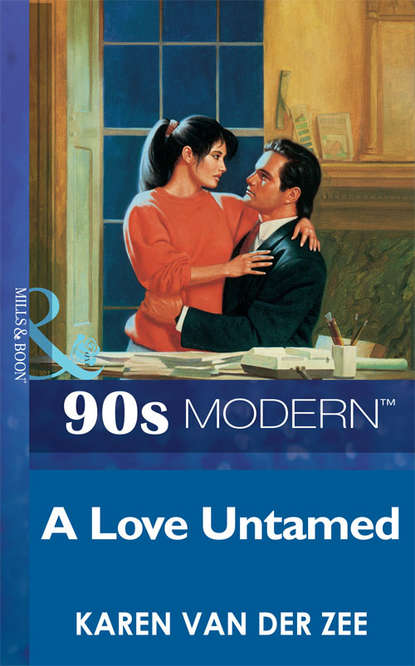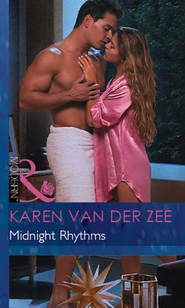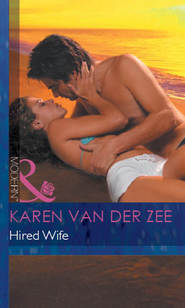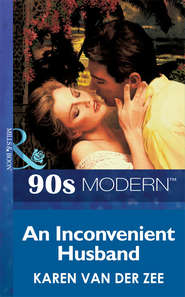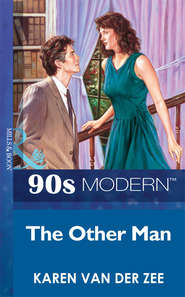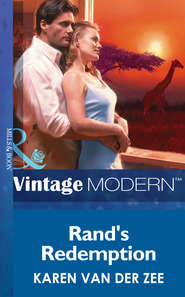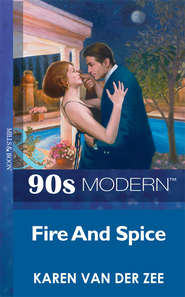По всем вопросам обращайтесь на: info@litportal.ru
(©) 2003-2024.
✖
A Love Untamed
Автор
Год написания книги
2018
Настройки чтения
Размер шрифта
Высота строк
Поля
‘Correct. Unbeknownst to me, my grandmother had made a new will. Apparently she thought I’d rather have the money than be burdened with the house.’
‘Good. Then it’s all cleared up.’
‘No, it’s not. My grandmother thought wrong. I do want the house. So this is what we’ll do. I’ll buy the house back from you and give you a five-per-cent profit.’
She laughed. She simply couldn’t help it. The audacity of the man was amazing. Did he think he could tell her what to do? Did he think that she would let this opportunity be taken from her just like that? She met his eyes unflinchingly. ‘No, sir, this is not what we will do. I bought the house because I wanted it.’
‘I’ll give you a ten-per-cent profit,’ he said calmly.
‘No.’
His eyes narrowed. ‘What do you want?’
‘I want this house. It’s a beautiful old house and I’m going to fix it up and make it even more wonderful. I’m going to make it a masterpiece of renovation,’ she said loftily. ’then I’ll sell it for every penny it’s worth to someone who’ll recognise the value of it. That’s the business I’m in. That’s what I do for a living.’ And she was very, very good at it. She had an eye for what would work, and what would not, and a brother who was an architect.
House renovation hadn’t exactly been the career she’d dreamed of since she was five. She’d wanted to be a ballerina then. She’d fallen into the remodelling business by coincidence, helping out a friend of her mother’s restore a trashed townhouse in Georgetown, a yuppie Washington DC neighbourhood. I can do this, too, she’d thought, and with a loan from her father she’d done just that. She’d made a huge profit. She’d paid off the loan and bought another house, repeating the process.
Now, six years later, she was making a respectable living, which was very nice because she loved to travel, which she did in between projects. She loved travelling even more than remodelling houses, which was a lot of fun. Having a job you loved doing was a great blessing, and she was well aware of it. She loved counting her blessings, which were many.
Clint was not happy with her reply. His jaw worked. ‘I don’t want it renovated,’ he said tightly.
’that’s too bad, because it’s not for you to decide.’ She couldn’t help feeling a nasty little twinge of triumph. She crossed her arms in front of her chest. ‘Besides, it’s stupid not to fix this house up. Have you seen the electricial wiring? It’s ancient! It’s a fire hazard! And the plumbing is medieval.’ She was beginning to like this man less and less. Which was not promising because she had liked him not at all to start with. He was arrogant and presumptuous and condescending.
He was also dangerously handsome and sexy.
All in all, a toxic mixture and not one that was easily dealt with. There was an innate sexuality about him that was hard to miss. It was nothing he did or said in particular. It was just there, an aura, something radiating from him, something that affected her more than she was willing to admit. It seemed so primal that it frightened her a little. After all, she was not the kind of woman who let herself be swept away just by a good body and a handsome face. She wanted more, a whole lot more.
He was observing her with an infuriating glint in his eyes. ’there’s more to you than meets the eye, is there?’
‘I wouldn’t know,’ she said coldly. ‘I’ve never had a first impression of myself.’
His mouth curved in amusement and for a moment, a long, endless moment, their eyes were locked in a wordless sizing up of each other, a recognition of each other, an acknowledgement. Her body grew warm, her pulse throbbed and knees began to tremble. It was hard to breathe. It was terrifying. He hadn’t even touched her. She broke her gaze away. She wanted to run away, out of that room with its dangerous vibrations, but she fought the impulse.
‘If you’ll excuse me, I have work to do.’ She heard the nervous quiver in her voice and prayed he wouldn’t notice.
Before she’d gone down on her knees again, he’d bent down and without a word rolled up the last strip of heavy carpeting and slung it over his shoulder as if it were nothing more than a wet towel.
‘In the skip?’ he enquired.
‘Yes.’ She watched him go, thrown completely off balance. She didn’t like the feeling. One moment he was insufferably autocratic, the next he made a helpful gesture like this—helping her do the very thing he was angry at her for doing. Through the window she saw him toss the carpeting effortlessly into the skip. He had dropped the subject of buying the house. He had not insisted, or made threats. However, she was not deluding herself in thinking the issue was dismissed and the discussion over. Clint Bracamonte was not a man who gave up.
He strode up to his car and opened the back, taking out two paper grocery bags. He put them down in the kitchen, then washed his hands before taking out the contents.
Strawberries, asparagus, sirloin steak, French bread, and double cream, butter, mushrooms, onions, the makings for a salad, and a small selection of French cheeses. A bottle of red wine with an impressive label joined the luscious foodstuffs on the counter.
‘What do you think you’re doing?’ she asked.
He smiled at her, a true blue Boy Scout smile that threw her even more off-balance. ‘I’m inviting you to dinner,’ he said, ’to repay you for your hospitality.’
She was lost for words.
What could she possibly say? Get out of my house and take your steak and strawberries with you? She’d be nuts. She’d worked like a horse all day, surviving on a breakfast burrito, a peanut butter sandwich and a couple of chocolate bars. She was famished. She stared longingly at the food he’d taken out of the bag. Why eat chicken soup and crackers if she could dine on steak, asparagus and strawberries and cream? And wine, too.
He studied her face, waiting for an answer. ’so, what do you say? It looks to me as if you could use a good meal.’ His voice was even. ‘You put in quite a day’s work.’
So she had. She straightened. ‘I’d love a good meal.’ It was the truth, and she wasn’t in the habit of lying. Also, it was difficult to resist him. She had to admit it. Besides, there was no harm in a meal together, was there?
‘Excellent.’ He reached in a drawer, found a corkscrew and opened the bottle. ‘How about a glass before dinner? Or are you a purist and want your wine to breathe first?’
‘I’m a purist only when it’s convenient. I’d like a glass now.’
Wine in hand, she left the kitchen, allowing him the freedom to do his cooking all by himself. She wasn’t much of a cook herself. It simply wasn’t one of her talents. However, she did like eating good food. Eating in nice restaurants worked very well, or at her mother’s house. Her mother did like cooking. Only her mother, as well as her father, were not presently in the neighbourhood. The government had sent them to Stockholm, Sweden.
Livia went into the living-room and started emptying drawers and packing more boxes, sipping wine. A vague, uneasy feeling stirred inside her. She pushed it back. Nonsense. No reason to feel this way. No obligation, no duty. The house was hers. Everything in it was hers. She’d bought it fair and square with her own money.
Yet the little fairy inside her was not happy.
When she was little, her mother had explained about that little voice inside her that sometimes bothered her when she’d done something wrong. It belonged to her personal little fairy of virtue that lived in her heart. The fairy loved her very much. The fairy told her what was right and wrong. As a little girl she had imagined the little fairy with small fluttering wings of gossamer silk, and a tiny candle in her delicate little hands, a candle to guide her on the right path.
As she was packing the boxes, the fairy fluttered nervously. Livia told the fairy to go for a nice long walk. The fairy did not oblige. Livia kept on packing. Ashtrays, doilies, chipped vases, a stained tea cosy, a box of buttons, a worn-out Scrabble game, a soft baby toy. She smiled as she looked at the brightly coloured cloth ball. Someone must have left it here. She tossed it into the box.
Her hands were dry from all the dust and all the washing she’d been doing. This wasn’t the sort of job that was compatible with soft hands and lovely, long nails, polished burnished copper or honey rose.
Clint called her less than an hour later. By then she was practically passing out from hunger. The table had been set. He’d even found a white tablecloth and candles. They were baby-blue and sat in crystal candlesticks. She liked the candlesticks. She was going to keep them for herself.
‘My grandmother loved these candlesticks,’ he said. ’she’d brought them with her from Poland when she and my grandfather emigrated. They were a wedding gift.’
Oh, great. Now she was going to have to feel guilty. No, she was already feeling guilty. Inside her the little fairy was practically screaming.
‘You can have them,’ she heard herself say. Guilt was a nasty emotion and not one she intended to cultivate.
‘I’ll buy them from you.’
Their eyes met. ‘I can’t have you buy back your own grandmother’s favourite candlesticks,’ she said. ‘Just take them.’
‘All that businesslike behaviour covers up a soft heart, doesn’t it?’ he said with a crooked smile.
‘Oh, please, spare me,’ she said derisively and concentrated on her food, which was delicious. She wanted to ask him who he was, what he was. But something inside her kept her from asking. The less she knew, the better it was. She already knew about a Polish grandmother and wedding-gift candlesticks. She wanted him out of her way. If he didn’t like her carting out all the old furniture, what was he going to say when the contractor arrived and some of the walls were going to come down?
‘What were you doing in the rainforest?’ she heard herself ask. She couldn’t help herself. She wanted to know. ‘Catching tropical birds and smuggling them out? Cutting down the trees for tooth-pick companies?’
He raised his brows. ’do you always think so well of people, or is it just me?’
She gave him a wide-eyed, innocent look. ‘Just a few wild guesses, that’s all.’ She smiled. ‘May I assume you’re doing something more honourable?’
‘I’m involved in a research project. I study the interaction between the indigenous people and their rainforest environment.’
‘Ah, a scientist.’





